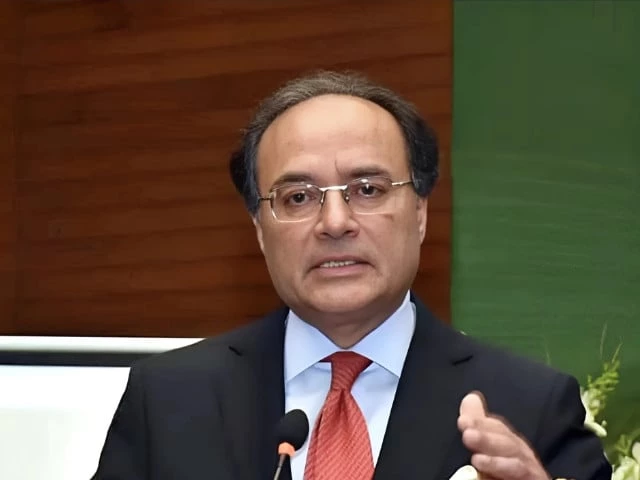FBR Rs1tr short of meeting IMF target
Under a condition from the IMF, the FBR is required to collect Rs6.009 trillion during July-December period.

Finance Minister Muhammad Aurangzeb hoped on Thursday that the International Monetary Fund (IMF) programme would continue but dodged a question whether the government was bringing a new budget or renegotiating the annual tax target because of a yawning shortfall.
Aurangzeb spoke at a press conference about the measures to broaden the tax base. His challenges had suddenly mounted as the Federal Board of Revenue (FBR) hardly achieved 50% of the Rs1.37 trillion monthly tax target as of Thursday.
Five days are left at the end of the month and the FBR still needed another Rs1 trillion to meet the IMF condition.
The government also hinted at compromise with the commercial banks on the issue of 15% additional advance-to-deposit ratio tax. It admitted that the non-filers would still be legally allowed to do transactions barring purchases of property, cars and shares.
"When the IMF mission will come we will have a discussion with them in good faith, as we are making every possible effort to get to the target," the finance minister said, responding to a question whether he would bring a mini-budget or seek reduction in the tax target.
Aurangzeb said that the government was making every effort to widen, broaden and deepen the tax base. "I am hopeful that the IMF programme will continue," he said, adding that the government was not backing off from any commitment given to the IMF.
Under a condition from the IMF, the FBR is required to collect Rs6.009 trillion during July-December period. As of Thursday, it could pool Rs5 trillion, making it harder to avoid the mini-budget. The annual target is nearly Rs13 trillion that has now become irrelevant due to the yawning shortfall.
The finance minister said that compared to 29% growth in tax collection, achieved in the last fiscal year, this year's 40% growth target was ambitious. He said that certain tax policy and economic assumptions did not work and as a result, the FBR was behind its target.
"If we do not give any surprise to the IMF then there will not be any issue", he hoped.
On the occasion, Minister of State for Finance Ali Pervaiz Malik and FBR Chairman Rashid Langrial briefed the media persons about the steps taken to collect due taxes from the wealthy people. However, the results were disappointing.
The FBR had sent notices to top 169,390 people to file returns and pay their taxes and 38,002 of them submitted the returns, said Langrial. This suggests that only one out of every five people responded to the FBR.
Worryingly, these 38,002 people paid a paltry sum of Rs377.6 million in taxes on an average Rs9,920 per case. This suggests that there was not much potential due to agriculture or foreign sources of income or the people were under-declared without having any fear of being caught.
The chairman said that the FBR had so far given show-cause notice to 451 persons, who had not responded to the notices for filing returns, hoping that in the next three months the show-cause notices would be served to about 150,000 persons.
The chairman claimed that the top 5% the income earners or 2.7 million people were not paying Rs1.6 trillion worth of income taxes. He added that those people would be gradually nabbed and in the first step the tax notices to 169,390 people had been sent.
The FBR chief said that the government's tax gap for the current fiscal year would further increase to Rs7.1 trillion, which was around Rs6.2 trillion last year. This shows that the gap would widen by Rs900 billion or 15% despite various enforcement powers that the FBR took in the budget.
Langrial shared that around 3.3 million individuals fell under the top 5% of the earning category. Out of those only 600,000 filed returns and paid Rs619 billion in taxes. "They are either filing below this category or are not filing at all. Their tax liability stands over Rs1.6 trillion," revealed Langrial.
The FBR chairman stated that even if the government added all categories below the top 5% of earners, the total unpaid tax liability was not over Rs134 billion. Aurangzeb said the reforms in taxation were a vital part of the government's structural reform agenda.
Malik said that safely assuming those individuals were liable to pay Rs50-60 billion in direct taxes. The difficult economic decisions that the prime minister took had not been even taken by very stable governments, said Malik.
He added that after the new enforcement measures no one could remain a non-filer. "Retailers are a hard nut to crack," said Langrial. The government also admitted that despite bringing new legislation, the non-filers would still be doing transactions by paying higher taxes.
"It is correct that non-filers can still do transactions but the government is not interested in getting returns from the rest of the 95% people, where there is hardly Rs140 billion tax potential, said Langrial. He admitted that there was a loophole in the sales tax law that allowed businesses not to get registered if their annual sales were less than Rs100 million.
The government also indicated towards striking a compromise with the commercial banks. The minister of state said that in the litigation cases, the voluntary settlement was possible based on cost-benefit analysis. Prime Minister Shehbaz Sharif had constituted a committee under the chairmanship of Deputy Prime Minister Ishaq Dar to negotiate with the banks.




















COMMENTS (2)
Comments are moderated and generally will be posted if they are on-topic and not abusive.
For more information, please see our Comments FAQ